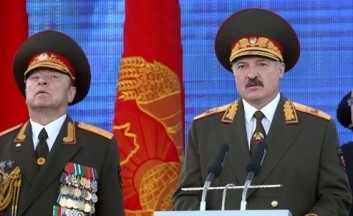Belarusian society affirms its demand for a strong leader
 The situation has not changed
The situation has not changed

Amid conflict in south-eastern Ukraine, Belarusian society is stepping up its demand for a strong leader and President Lukashenko is growing in popularity. However, regardless of Lukashenko’s growing popularity, the Belarusian authorities are concerned about the level of population’s loyalty to the government. The Belarusian government is undertaking measures to consolidate the population around the idea of Belarus’ independence and sovereignty however, so far, the authorities’ actions were non-systemic and often contradictory.
According to recent polls by IISEPS, the president’s popularity rating is on the rise.
Since early 2014, President Lukashenko’s popularity rating has been climbing: in December 2013 only 37.7% trusted him, 45.9% in March 2014, and 49.6% – in June 2014. The president’s electoral rating has remained unchanged at 39.8% (in response to an open-end question), and even slightly increased to 48.1% in response to a closed question. Interestingly, the growth of the president’s rating does not correlate directly with the people’s welfare growth. According to the Statistics Ministry, the average salary in December 2013 was USD 620.6, slightly decreasing in May 2014 to USD 604.1. In addition, the Belarusian authorities could not demonstrate any progress in socio-economic development.GDP growth in January – April 2014 was only 1.1%.
Events in Ukraine continue to have a significant impact on voters’ preferences in Belarus. Amid the armed conflict in south-eastern Ukraine, Belarusian propaganda has been focusing on praising the safe living conditions in Belarus provided by the authorities. However, the Belarusian authorities have been unable to counteract the Kremlin’s propaganda about events in Ukraine. Despite Moscow’s numerous attempts to draw Minsk into Russo-Ukrainian confrontation, the Belarusian leadership is trying hard not to spoil relations with the Ukrainian authorities and to adhere to neutrality.
President Lukashenko has reiterated the need to preserve Ukraine’s territorial integrity numerous times and recognised the new Kiev authorities. However, according to the latest national poll by IISEPS, most Belarusians support the Kremlin’s aggression against Ukraine – 62.2% of Belarusians uphold Russia’s annexation of Crimea as restoration of historical justice. It should be noted that public opinion in Belarus was partly influenced by the contradicting messages from official Minsk during the Russo-Ukrainian tension, and largely by the Russian media, which dominate the Belarusian information space.
The Belarusian government cannot but be concerned about the influence the Russian media has in Belarus. For the first time in two decades, President Lukashenko spoke Belarusian at a public meeting devoted to the 70th anniversary of Belarus’ liberation from the Nazis (Independence Day, July 3rd). In particular, he said, “This unity saved us during the war. It gave us the wisdom and strength to build an independent Belarus in the new times. Anyone who raises a hand against the nation’s unity is the enemy of Belarus”.
Nevertheless, the government sends confusing signals to the Belarusian society. For example, the only Belarusian-language teacher who was critical of the government’s policy was recently fired from Grodno Medical University.
The Belarusian authorities will take measures to boost the population’s loyalty to the government. Due to the lack of achievements in socio-economic development, the president will focus on the anti-corruption measures and Belarusian propaganda will exploit developments in Ukraine to maintain the authorities’ rating.
Subscribe to our newsletter




Situation in Belarus
Constitutional referendum: main consequences


 Video
Video
How to count the political prisoners: are the new criteria needed?


 Video
Video
Paternalism In Decline, Belarusian Euroscepticism, And The Influence Of Russia


 Video
Video












